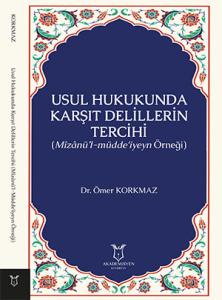Usul Hukukunda Karşıt Delillerin Tercihi (Mîzânü’l-müdde‘iyeyn Örneği)
Synopsis
Bu çalışma, Dr. Ömer Korkmaz tarafından kaleme alınan \"Usul Hukukunda Karşıt Delillerin Tercihi (Mîzânü’l-müdde‘iyeyn Örneği)\" adlı kitabın önsözünde yer alan bilgileri içermektedir. Kitap, Osmanlı döneminde tercîhu’l-beyyinât literatürüne katkı sağlayan Esîrîzâde Abdülbâkî Efendi'nin hayatı, eserleri ve özellikle \"Mîzânü’l-müdde‘iyeyn Fî İkâmeti’l-Beyyineteyn\" adlı risalesi üzerine odaklanmaktadır.Öncelikle, Osmanlı Devleti'nde ilmî tahsilini tamamlayan İslam âlimlerinin genellikle fetva, kaza (yargı) ve tedris (eğitim) alanlarında görevlendirildiği belirtilmektedir. Bu nedenle, Osmanlı âlimlerinin yazdığı eserlerin çoğunun bu üç görevi yapan meslek sahiplerine yardımcı olacak nitelikte olduğu ifade edilmektedir.Esîrîzâde Abdülbâkî Efendi'nin hayatı ve eserleri incelenerek, özellikle \"Mîzânü’l-müdde‘iyeyn Fî İkâmeti’l-Beyyineteyn\" risalesi üzerinde durulmaktadır. Bu risalede, iki kişinin aynı mala sahip olduğunu iddia ederek yargı önüne geldiklerinde hangi delilin tercihe şayan olduğu konusu ele alınmaktadır.Kitapta ayrıca, Hanefî mezhebinde fetva usûlü, zilyed ve hâric kavramları gibi konuların yanı sıra risalede yer alan bazı kavramlar da açıklanmaktadır.Bu çalışma, Esîrîzâde Abdülbâkî Efendi'nin tercîhu’l-beyyinât literatürüne katkısını ve özellikle \"Mîzânü’l-müdde‘iyeyn Fî İkâmeti’l-Beyyineteyn\" risalesinin önemini vurgulamaktadır.
This study contains information from the preface of the book \"The Preference of Contradictory Evidence in Procedural Law (The Example of Mîzânü’l-müdde‘iyeyn)\" written by Dr. Ömer Korkmaz. The book focuses on the life, works, and especially the treatise \"Mîzânü’l-müdde‘iyeyn Fî İkâmeti’l-Beyyineteyn\" of Esîrîzâde Abdülbâkî Efendi, who contributed to the literature of tercîhu’l-beyyinât during the Ottoman period.Firstly, it is stated that Islamic scholars who completed their scientific education in the Ottoman Empire were generally assigned to the fields of fatwa (religious ruling), qadi (judiciary), and teaching. Therefore, it is mentioned that the majority of the works written by Ottoman scholars were intended to assist professionals in these three fields.The life and works of Esîrîzâde Abdülbâkî Efendi are examined, with a particular focus on the treatise \"Mîzânü’l-müdde‘iyeyn Fî İkâmeti’l-Beyyineteyn\". This treatise discusses the issue of which evidence is preferable when two individuals come before the court claiming ownership of the same property.The book also explains topics such as the methodology of fatwa in the Hanafi school of thought, as well as concepts like zilyed and hâric, which are mentioned in the treatise.This study emphasizes the contribution of Esîrîzâde Abdülbâkî Efendi to the literature of tercîhu’l-beyyinât and the importance of the treatise \"Mîzânü’l-müdde‘iyeyn Fî İkâmeti’l-Beyyineteyn\".
Downloads

